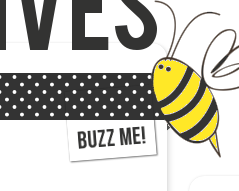Doctors tell you what to look for during an allergic reaction. You've seen these anaphylactic reactions so you know what they entail. You alert everyone to look for hives, swelling, redness, shortness of breath, and wheezing. Numerous online articles are dedicated to outlining all the possible symptoms of an allergic reaction. It's important to quickly recognize these symptoms and be ready to respond with medication. But no one tells you what life is like immediately following an allergic reaction.
Here is what happens at our house after a reaction:
- Bee is exhausted. She will often go straight to bed and sleep for hours after a reaction. She's usually very tired for the next few days as well.
- Bee is swollen - often for several days. This swelling is usually somewhere on her face or her neck.
- Bee is stuffy and runny. She sounds like she has a terrible cold and she needs lots of Kleenex.
- Bee has a cough. She will start coughing during her reaction and the cough will linger for several days or even a week. It's usually a dry cough that occurs throughout the day and can be worse at night.
- Bee is itchy. While the itching is uncontrollable during an allergic reaction, she might still have some minor itchiness for several days afterward. This means lots of lotion, cool baths, steroid cream, and humidifiers.
- Bee has a rash. During the reaction Bee usually has a full body rash of hives. After the reaction calms down, she is usually left with patches of a red, bumpy rash. This is usually her eczema flaring up and making her feel hot and itchy.
- Bee needs Benadryl. We often need to treat her discomfort with some Benadryl for a few days. It also helps prevent a rebound reaction since it does take a few days for the allergen to completely exit her system.
- Sometimes Bee needs oral steroids for a few days. While I don't like giving her steroids, they are sometimes necessary following a severe reaction. They keep the swelling down and help prevent a rebound reaction.
Usually with an allergic reaction we spend about 6 hours in the ER to treat the reaction and monitor Bee. After that, we go home with an exhausted child who is still miserably uncomfortable. Then we spend the next few weeks hovering over her, watching for any signs of another reaction and worrying ourselves silly. Thankfully, she's never had a severe rebound reaction and after a few days, is feeling like her old self again.
While a reaction is very scary and stressful to the child, what does the recovery process look like for the parents?
- We are weary and exhausted. We usually feel like we need a nap after our ordeal. It's almost like feeling you've been up for days and then run over by a truck. It's a terrible kind of tired.
- I usually have a migraine. The stress and panic of the reaction usually sets off a migraine for me. Not only am I tired, but I have to spend the next day in bed with a pounding headache.
- We are stressed. Nothing can ruin your day like seeing your child unable to breathe. It makes us feel stressed and that stress and anxiety linger for weeks.
- We feel guilty. After every reaction we analyze what we did and what we didn't do. We feel guilty wondering if we could have prevented the reaction or if it was somehow our fault.
- We become hyper vigilant. If you thought we are always neurotic, you should see us after a reaction. We check and double check everything. Many days we don't even feel like leaving our little allergy free house. We also tend to hover over Bee and worry about everything she touches.
- We lose trust in both ourselves and others around us. The guilt compounds and we feel completely overwhelmed and unable to cope with our allergy lifestyle. We question everything we do and cook. We also refuse to eat out for a time and we try to stay away from everyone for a few days to allow us some recovery time. We feel like we're second-guessing ourselves and everyone around us.
- We plan for the next time. After each reaction we come away a little more knowledgeable and a little more prepared. We talk about what we would do differently next time and how we can be better prepared for an emergency.
We experience the aftermath of an allergic reaction for weeks and sometimes months after the initial incident. Once the initial reaction is over, there is still a long recovery time. This recovery is not just physical, but is mostly emotional.























